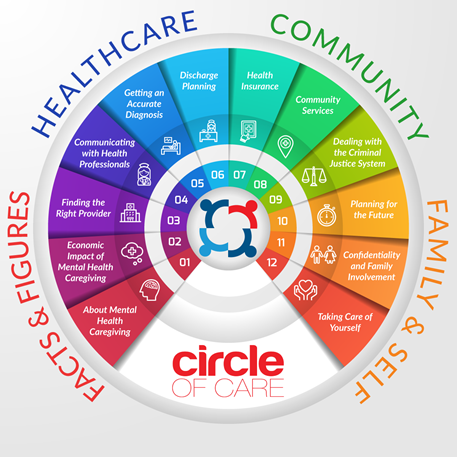There are as many as 8.4 million family members in the U.S. caring for relatives who live with emotional or mental health conditions (not including cognitive impairment). If you’re one of those caregivers, you may face unique challenges that make caregiving even more difficult – and more stressful – than what a typical family caregiver might experience.
Mental Health Conditions Affecting Older Adults and Their Caregivers
The National Alliance for Caregiving published On Pins and Needles: Caregivers of Adults with Mental Illness, a report on mental health caregiving. The study found that the average mental health caregivers are women who are 54-years-old and are typically caring for a relative (88%) with one of the following conditions: bipolar disorder, schizophrenia, depression, anxiety, alcohol or drug abuse.
Mental Health Caregiving
- Providing full or partial financial support to your loved one
- Managing their medication and complex medical care coordination
- Being the sole caregiver because no other family members are able or willing
- Investing much more time and effort into care advocacy for your loved one
- Higher levels of personal stress and daily care burden than other family caregivers
Most older adults do not suddenly receive a serious mental health condition diagnosis later in life, but conditions like depression or anxiety can arise in older age. Any significant or prolonged change in your loved one’s behavior or mood deserves to be evaluated by a mental health professional.
Helping Your Loved One can be a Challenge
Accessing mental health status is an issue in general and older adults, in particular, often balk at seeing a mental health specialist. The idea of going to a therapist or counselor may be resisted because of the stigma surround mental health, or for more practical reasons, such as paying for treatment, finding a provider or getting transportation to appointments.
Beyond the interpersonal challenges of getting your loved one the right care for a mental health condition, caregivers may also experience issues with health insurance coverage, finding providers, dealing with in-patient mental health stays and other challenges the average caregiver never copes with.
Learning how to manage the unique challenges of mental health caregiving – along with your own well-being – can make you a more effective caregiver.
Circle of Care Guidebook
The guidebook focuses on 12 areas of mental health caregiving that affect family caregivers, including:
- Finding the right provider
- Communicating with mental health professionals
- Getting an accurate diagnosis
- Health insurance considerations
- Community support services
- Planning for the future
- Family involvement

Find Additional Resources and Support
Consider the following local and national resources if your loved one is experiencing mental health issues:
- Hire outside help to provide companionship and assist your loved one at home, giving you some respite. Find a Care Professional.
- Suicide Prevention Lifeline: 1-800-273-TALK (8255) or TTY: 1-800-799-4889
- Veteran’s Crisis Line: 1-800-273-8255 or TTY: 1-800-799-4889
- Eldercare Locator includes local mental and behavioral health services
Don’t Overlook Self-Care
Taking care of a relative with a lifelong mental health condition takes patience and stamina, but don’t forget self-care. You cannot draw from an empty well. Don’t hesitate to call on family members to provide you with respite – or to schedule a Care Professional to give you time to pursue your own interests and refresh yourself mentally and spiritually. You deserve it.




